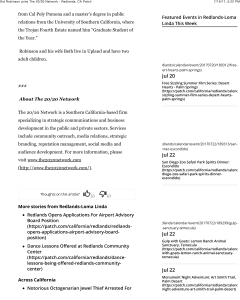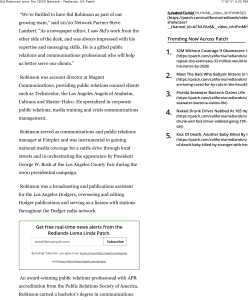Early this year, the City of Upland’s move to divest itself of its municipal fire department and annex the entirety of the city into a county fire service assessment zone to allow the county fire department to assume fire protection duty in Upland led to some residents resisting the change. All five members of the council at that time remained solidly supportive of the changeover. Councilwoman Janice Elliott, however, held a town hall meeting at which some Upland and San Antonio Heights residents questioned the wisdom of the fire department divestment and whether the city and the San Bernardino County Local Agency Formation Commission had the legal authority to impose on the two communities an assessment district a majority of those residents did not vote to approve. By April senior Upland city staff and Elliott’s council colleagues were growing impatient with her indulgence of residents resisting the fire department closure. At the April 24 and again at the May 8 Upland Council meetings, the city council adjourned into a closed session from which members of the public were excluded but at which the city’s public relations consultant, Steve Lambert of the 20/20 Network, was present. In those closed door sessions, Elliott was taken to task over what members of the city council considered her unwillingness to act as a “team player.” At the May 8 meeting, a protocol for council behavior, titled “In House Policy of the Upland City Council” was reviewed and initialed or signed by all of the council members.
Shortly thereafter, Elliott approached the San Bernardino County District Attorney’s Office with concerns that the Upland City Council may have engaged in violations of the Ralph M. Brown Act, California’s open public meeting law, which prohibits public agency boards such as a city council from meeting in secret or closed sessions and discussing anything other than potential or ongoing lawsuits, real estate transactions, contract negotiations, employee discipline or firing, and employee public union collective bargaining. The district attorney’s office launched a routine and low key investigation into the matter, turning up indicators, such as the In House Policy of the Upland City Council document, that the city council had indeed engaged in discussions in closed sessions beyond the scrutiny of the public that should have been carried out in an open public session. After the Upland City Council at its June 12 meeting voted to strip councilwoman Elliott of three of her most prestigious adjunct committee assignments in a move widely seen as retaliation against her for having brought the district attorney’s office’s attention to the alleged Brown Act violations, the district attorney’s office intensified its investigation. Investigators, either through their own initiative or by tips provided by members of the Upland community, learned that councilman Sid Robinson was or once was a professional affiliate of both the 20/20 Network and Steve Lambert, who was present at both the April 24 and May 8 city council meetings where the Brown Act violations were alleged to have occurred. Investigators further learned that Robinson, since coming into office, had voted numerous times to approve the city’s payments to the 20/20 Network.
With the investigation widening, information about the district attorney’s office’s inquiries with regard to the Upland City Council and Robinson’s connection to 20/20 began to circulate around the community. On July 21, the Sentinel published an article that reported on the investigations and the issues being focused upon. Steve Lambert, Sid Robinson and Upland City Manager Martin Thouvenell took exception to the Sentinel’s report, and in short order lodged demands for retraction from the Sentinel. Lambert characterized the Sentinel’s journalistic coverage of the investigation as irresponsible, misleading, false, damaging to his company’s reputation, defamatory and libelous, as well as “wildly speculative and conspiratorial.” Robinson called the article “potentially libelous.” Thouvenell said the article contains “malicious and inaccurate statements.”


Exhibit I from the Sid Robinson Investigation file is a January 28, 2014
article by Steve Lambert praising Mr. Robinson’s skills and heralding him
as a new member of the 20/20 Network.
Beginning with its July 28 edition, the Sentinel has been marshaling the documents and materials upon which the research for the July 21 article was based, publishing in serial format exhibits within the district attorney’s office’s case file on the investigation into the Brown Act violation and Sid Robinson’s relationship with the 20/20 Network. The Sentinel is doing this so its readership can ascertain for itself whether the July 21 article was in any way unfair to Mr. Lambert, Mr. Robinson or Mr. Thouvenell and if the reporting went beyond the facts contained in the documentation the Sentinel relied upon in its research of the issues relating to the investigation. This week the Sentinel is publishing Exhibit I, an article written by Steve Lambert and published on January 28, 2014. In that article, Steve Lambert quotes himself as saying “We’re thrilled to have Sid Robinson as part of our growing team.”
While examining the individual investigative file exhibits separately or in installments may provide the casual reader with insufficient context upon which to make any type of judgment, the reader should be able to orient him or herself to the germane issues by finding a copy of the July 21 Sentinel and reading the article “Robinson Denies Upland’s Contract With His Affiliate Constitutes A Conflict” and the July 28, August 4, August 11 and August 18 editions of Sentinel which included Sid Robinson investigative file exhibits showing how the original Brown Act investigation evolved to the point that the circumstance involving councilman Sid Robinson and his relationship to the 20/20 Network came into focus for the investigators.
The Sentinel will publish further exhibits.

